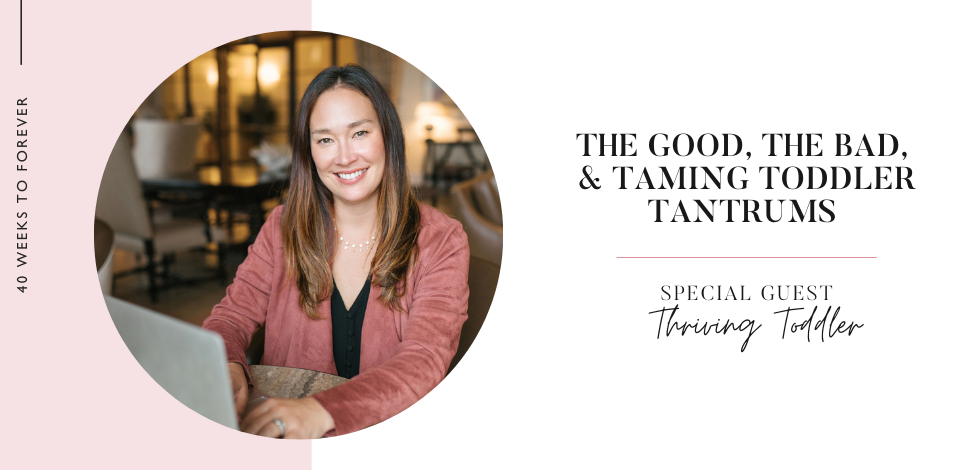Parenting: The Good, the Bad & Taming Toddler Tantrums
Jump to Section

Welcome to Parenthood!
- You’ve served pancakes instead of waffles for breakfast [even though they asked for pancakes.]
- You’ve cut a sandwich the wrong way at lunchtime
- You’ve served that sammy with milk in the blue cup, not the yellow cup
There is no one size fits all book or strategy for parents to follow. So where do we start and how do we raise emotionally balanced children?
In episode 7 of the 40 Weeks to Forever podcast we chat with Michelle from Thriving Toddler about all thing's toddlerhood. Michelle is a Licensed Marriage and Family Therapist and Board-Certified Behavior Analyst who is passionate about teaching you evidence-based strategies that are grounded in science. In this episode we chat about self-regulation, getting curious about behaviours, and how to deal with separation anxiety.
Listen Now
Episode Convo Highlights
Parents across the country are doing their best with the knowledge and the tools that we have. And today, we have access to so many more parenting resources and exposure to different styles. So, where do we start?
Great question, where do we start? You know, I think we start from how we were parented, right? So we carefully look at, you know, what, what did I like? What do I remember? How did they discipline me? What do I want to leave behind, right? And then also, in conjunction with that, it's all of the materials that we have access to whether it be books or social media. So there's a lot of resources out there that we can pull from, and if you're a mom, or a dad, or you know, a parent on social media, that the information is overwhelming. And so, I like to tell parents this, get on the same page as your partner, that is probably the number one best thing that you can do is make sure that you two are on the same page and knowing your parenting values. And so that might require a little bit of time of sitting together and talking about what's important to us. How do we want to raise our kids? How do we want to discipline them? Right? So you would want to ask your partner questions like, you know, how did your parents respond to these difficult situations? Because every parent obviously responds differently. So I think that that's really the first place to start is, where are you guys both at? And how do you want to raise your children?
What do we do during a meltdown moment where our usual tactics just aren't working?
Yeah, this is a beautiful question. And, you know, I wish parenting came with a manual, right, like human behaviour is, is complex, and there is no kind of one size fits all it really just depends on what's going on in the moment, for that child, the child's age, and you do label the emotions. I think that that's very important. Emotional literacy, at this age, is kind of the foundation of their social-emotional skills. And so I think it's really important for parents, and I'm a big advocate of that, to label the emotions to validate the emotions, because all emotions are welcome. But what we're teaching them is that not all behaviours are welcome, right? Especially inappropriate ones, especially ones that are harmful or not safe, right? Like, we don't want our kids to be hitting other children at preschool or when they're away from us. And so this kind of this idea goes back to okay, well, my childhood, you know, is in the middle of a tantrum, I'm validating them. I hear that they're upset and again, depending on the level of a tantrum, right, so like, I like to look at it this way. I like to scale my own child's tantrums. And the way that looks is I use a scale of one to 10. And I say, okay, my child is at a level 10. Ten being like, this is like a big deal for her and she's just not operating in the frontal lobe at all. So, what I'm going to do is I'm just going to ride it out with her, like, ‘I see that you're upset sweetheart, I'm just going to sit down right here and wait for you until you're ready’, right. And at the same time for her, I'm also teaching her how to just calm her body down, right, calm her nervous system down, usually through basic mindfulness exercises and breathing exercises. So I'm trying to model that for her because me verbally prompting her to say, ‘hey, sweetheart, take a deep breath’, it's probably not going to work if she's at a level 10. Versus, let's say, my child's having a tantrum, but she's probably at a level four. So she's more like, maybe whiny. Maybe like kicking and screaming. But that might be a good time for me to say, ‘hey, like, I'm going to show you how I take deep breaths to calm down’. And I'm going to model it for her, I'm going to do it in front of her. And if she does it great, like I give her kudos for it. And if she doesn't do it, I just keep trying. Because actually, what that's doing in the moment is it's actually helping me as a parent more than it is my child because it's calming my nervous system because we have physiological responses to our child's challenging behaviour. And so I think that that's a really beautiful skill to practice because it helps us stay calm so that we can show up for our kids and be consistent for our kids.
What's your advice for effectively repairing in those situations where we've lost our cool because no parent is perfect, no matter what you hear or see or read.
I think the repair is crucial. I think the repair is everything. You know what, because it's unrealistic of us to be quote, unquote, perfect. I know that some of us out there do put a lot of pressure on ourselves, okay, me included. Okay, I'll talk for myself. And despite all of my education and training, I resort to these what we call default technologies, like yelling, right? And I am not proud of that in the moment, but I am also human. And so, one, yes, I do have to show myself grace and saying, ‘I am only human too, and I'm doing the best that I can, in this moment in time’. But what's more crucial, is when you're ready to come back to the situation and say, I'm talking to my daughter right now, I'm saying ‘Sweetheart, like mommy is not proud that I yelled, I know that that was very scary. I'm very sorry that I scared you. And I'm going to try and do better next time’. And then it's so sweet because she's like, ‘okay, Mommy, no big deal’. And I'm just like, ‘ah, I just love you so much’. You know, like, I want to do right by you. And I don't feel good about that. But you know, what, I've modelled that, the importance of saying like, it's okay to have like a short rift, as long as there's a repair, right. And that creates and maintains that strong healthy attachment between parent and child.
About Our Guest:
Michelle Tangeman is a licensed Marriage and Family Therapist and Board-Certified Behavior Analyst who is passionate about teaching you evidence-based strategies that are grounded in science. As a mother of two children and as a parent herself she knows how challenging it can be. She operates the account @thriving.toddler on Instagram and offers online courses that will help you thrive as a parent. She is also the host of the podcast “Parenting Understood”.Listen Anytime, Anywhere!
On this season of 40 Weeks To Forever, we are chatting with both moms and experts, who are sharing encouragement, advice, and answering some of the most common questions all parents have (some you didn't even know to ask)!
- Episode 1: Delivery, Doulas, & Diapers (For Mom)
- Episode 2: Is Breastfeeding Supposed to Suck?
- Episode 3: Pushing, Pooping, & Your Pelvic Floor
- Episode 4: Good Night, Sleep Tight
- Episode 5: First Foods & Toddler Table Manners
- Episode 6: Protecting Your Precious Cargo


